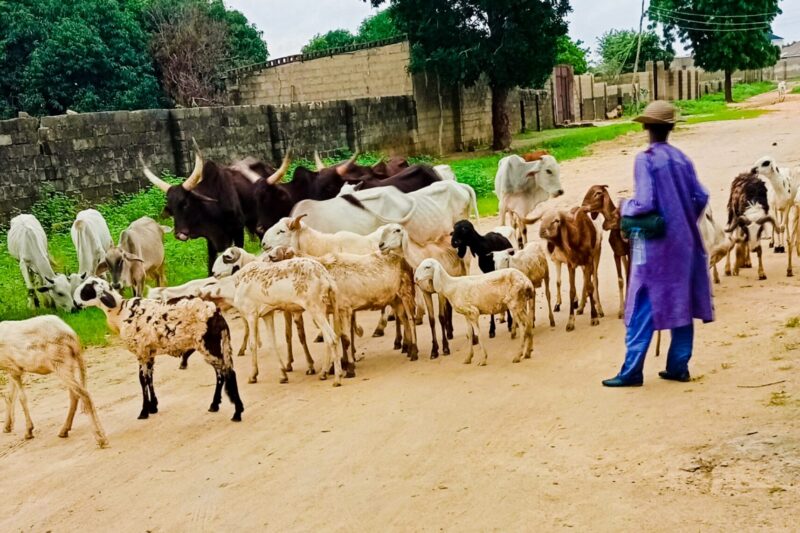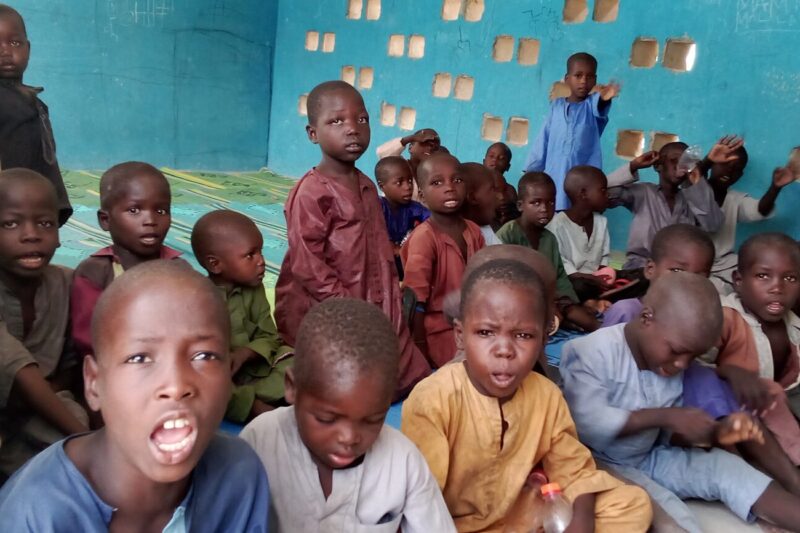Tension is high in the Monguno district of Borno State as anxious farmers prepare for harvest – all the while on the lookout for nomadic herders and their voracious livestock.
Five farmers are recuperating after sustaining deep lacerations and punctures in a clash with herders in the Monguno district of Borno State.
An unknown number of herders were also injured in the fight.
Tension is high in the Monguno Local Government Area as anxious farmers prepare to harvest their crops – all the while on the lookout for the nomadic herders and their voracious livestock.
Neither the farmers nor the herders trust each other and the possibility of sudden violence is uppermost on their minds.
Both parties have in the past fought to the death.
Violent conflict between the herders and agrarian communities is not new. Clashes have occurred for years – usually during the post-planting and harvest seasons – as both groups fight over the use of land and resources.
Amnesty International estimated that between 2016 and 2018, there were more than 3,600 deaths recorded in clashes and escalating violence between herders and farmers.
Climate change has forced herders – mostly from the Fulani and Shuwa Arab ethnic groups – to seek alternative places to feed their cattle.
Increasing desertification and deforestation have contributed significantly to the herders’ migration and, by implication, the continual violent clashes between the two.
Farmers across Borno State, who are expecting a bumper season this year, have expressed deep concerns and fear that the herders and their cattle, sheep and goats could destroy their crops before the harvest.
When Masa Merebe, a farmer from Monguno, went to his land a few days ago his worst nightmare came true.
“My crops were destroyed – everything had been grazed. The herders and their livestock came in the dead of night. When I got to my land in the morning, the herders and their animals were gone and my crops were destroyed.
“Other farmers have had the same experience. After investing thousands and looking forward to a bumper harvest, we are left with nothing.”
Merebe said it was common practice for the herders and their livestock to wait until night to enter farmlands.
“They come when most of the farmers are at home asleep. Farmers are so anxious about this that some of them now spend the night on their land to protect their crops.
“It’s extremely dangerous because the farms are mostly in the forest where insurgents hide. The herders are armed with cutlasses, swords, knives, bows and arrows and sticks. If it’s not insurgents, there’s a chance you will be attacked and killed by herders.
“The herdsmen also terrorise people. Just the other day, herders went to a farm that belongs to a woman. They intimidated her and stole unprocessed beans and other produce. She was terrified and thought she would be killed. She is lucky to still be alive.”
Merebe said it was also commonplace for herders to steal farmers’ livestock.
“Every year it is the same and every year we complain to the authorities. Yet, still, we face the same challenges. The government tells us not to panic and not to take the law into our hands. But what are we supposed to do? Surely it is our right to protect our land?”
Modu Modu Ali is one of the five farmers who was badly injured when herders attacked farmers on their lands last week.
“Five of us were seriously injured. The herdsmen attacked us with cutlasses and bows and arrows. Others had knives and sticks. We had to defend ourselves. We are prepared to do whatever it takes to protect our lands. We will do so at any cost.”
Ali said the clash occurred on Wednesday, October 11.
“It was at about 11am when the herders arrived. We were determined not to back down and we fought to protect our land. There were injuries on both sides. Five of us had deep cuts on our hands and legs. Some had deep slashes on their heads.
“After the fight, we were taken to hospital for treatment. Most have been discharged and we are recuperating at home.”
Ali said farmers had been expecting the herders and were on the lookout.
“They always come when we start harvesting our crops. We complain to security operatives and authorities but nothing is ever done to improve the situation.”
Liman Alhaji Kalla is the executive chairman of the Monguno Local Government Area. He is also a member of a committee constituted in January by Borno State governor Babagana Umara Zulum to investigate the causes of farmer-herder conflicts.
He told RNI that the local council was working with the state government to find ways to put an end to violence.
“We have deployed more security operatives in Monguno, including the military, members of the Civilian Joint Task Force [CJTF] and local hunters and vigilantes.
“About 80% of farmers have engaged in this year’s seasonal farming activities in the Monguno Local Council and we deployed more security to conduct daily patrols. Security personnel also escort farmers to their land so that they can farm without fear or threat.
“We are aware of the dispute that occurred last week between herders and farmers. The committee is trying to address the core issues and the root causes of farmer-herder violence.
“We received some classified information and intel that most farmer-herder attacks are incited by criminals who secretly brainwash the herdsmen and fill their heads with propaganda and untruths. This leads to chaos and conflicts.
“Relevant stakeholders and security agencies are working to fish out the perpetrators.
“Security operatives have arrested some of the herders. The local council has summoned both parties – the herders and the farmers –to try to resolve the issue peacefully. Some of the herders have agreed to compensate farmers whose crops were grazed and destroyed.
“I urge the good people of Monguno, particularly the farmers, to report any issues with herders to security operatives or the local council authority so that prompt action can be taken. They must not keep quiet.”
In January Zulum said the committee’s mandate was to determine the causes of conflicts between farmers and herders and to recommend measures to prevent future violent occurrences.
The committee would identify and document grazing reserves and their current status.
It was also investigating the re-establishment of defunct cattle routes and would identify grazing reserves that were not being adequately used.
Zulum urged farmers across the state to be law-abiding and “to shun all acts that could lead to violence”.
Tijjani Goni Modu, a senior special adviser to the government on livestock matters, said the committee was working with representatives of the herders and those of farmers from agrarian communities across the state to pave the way forward for dialogue and peaceful resolution of the longstanding conflict between the two.
SHETTIMA LAWAN MONGUNO








